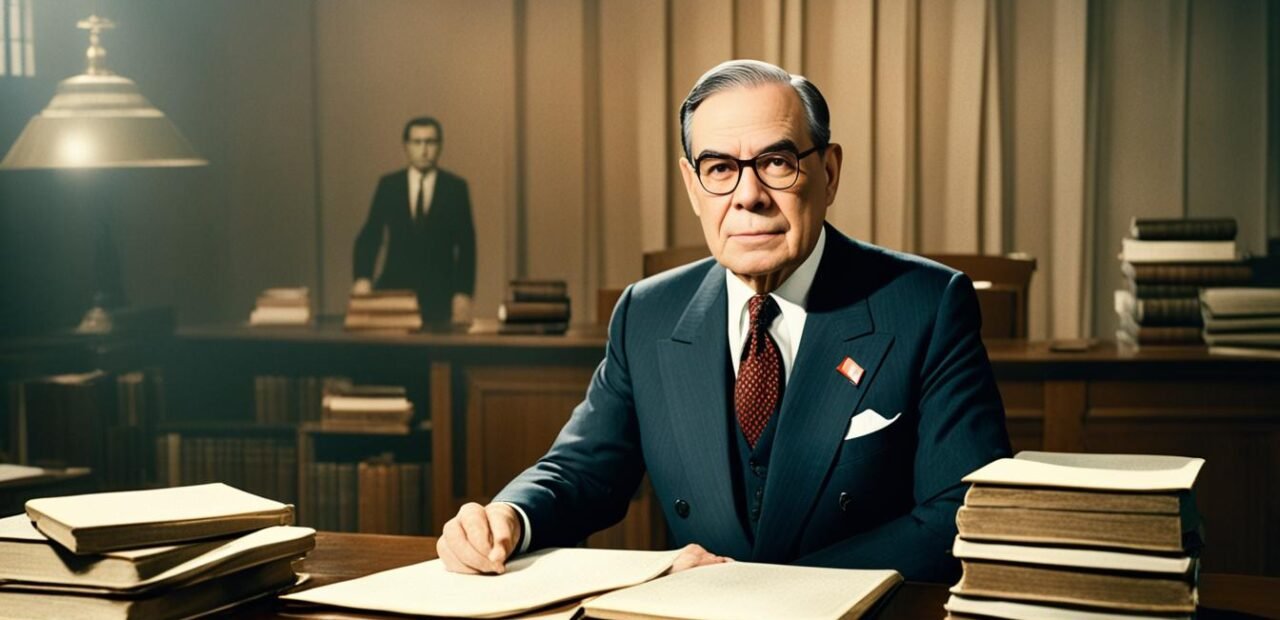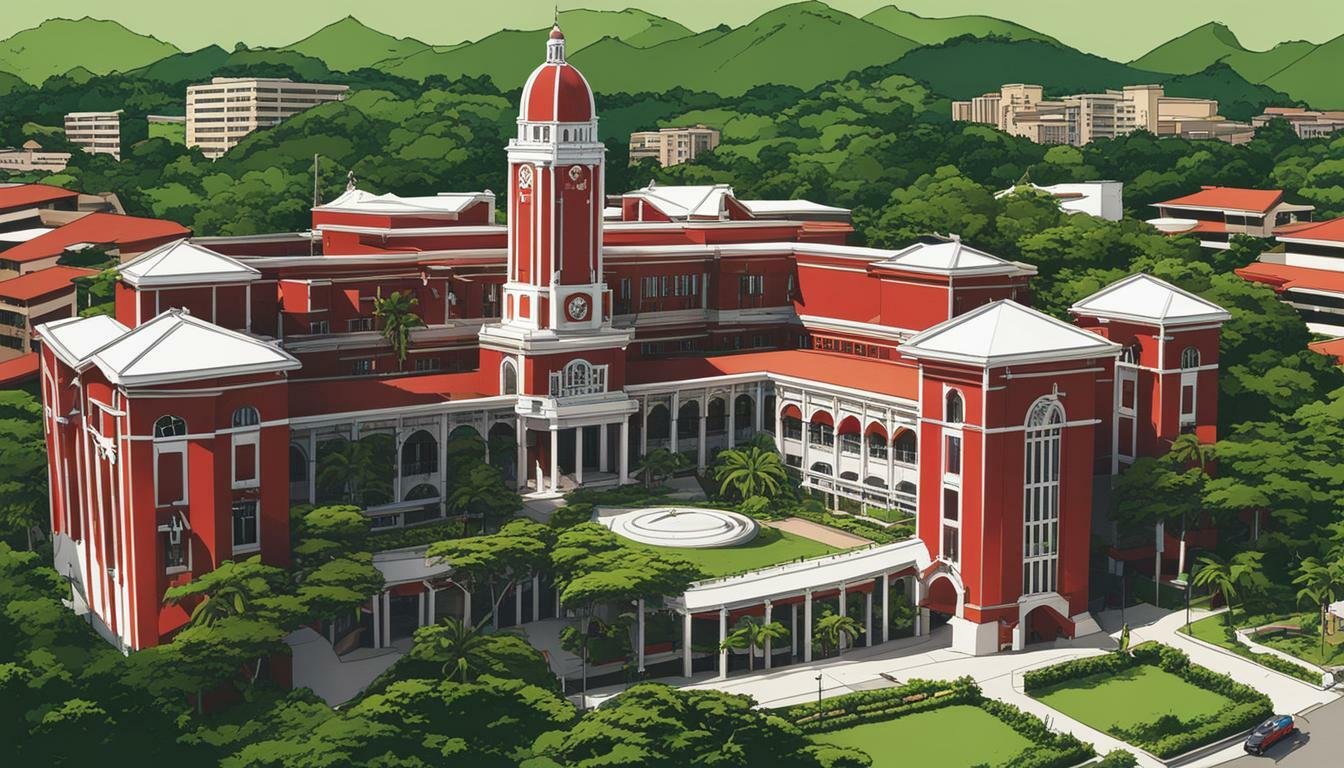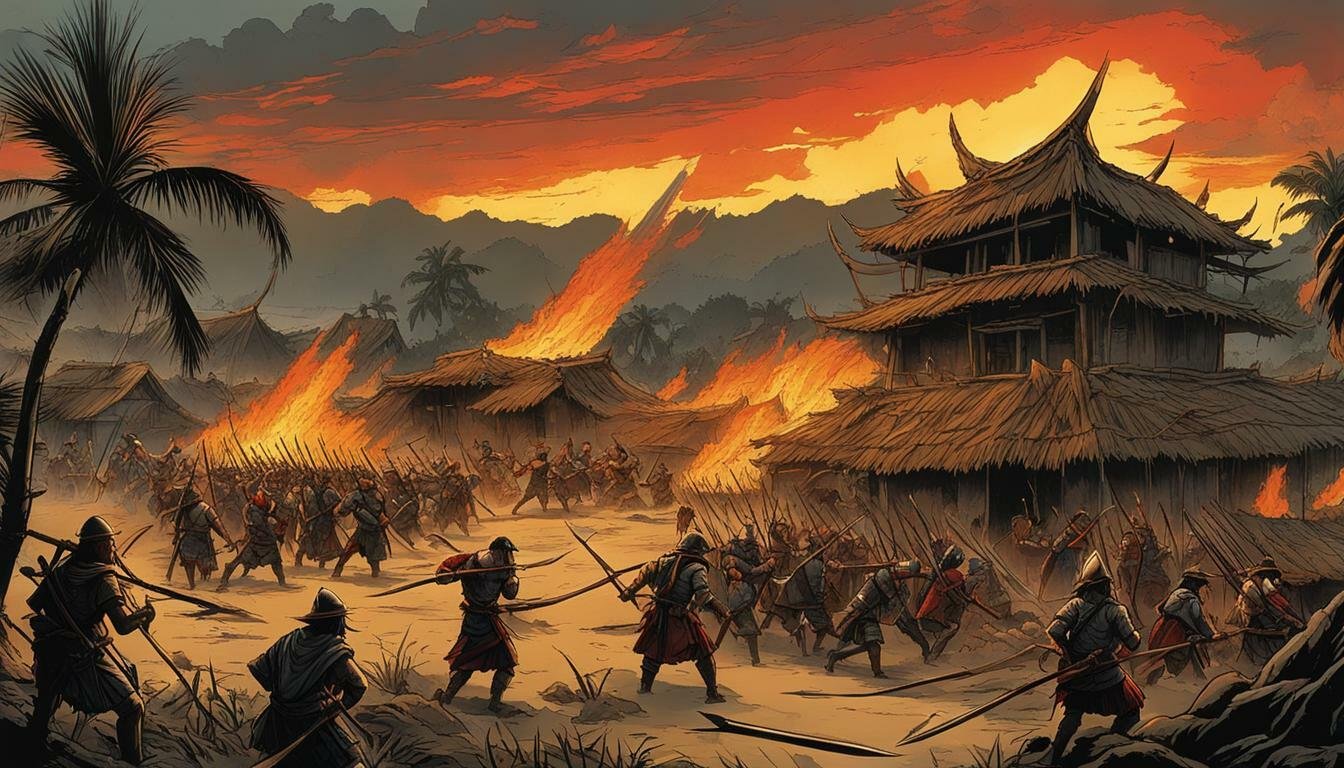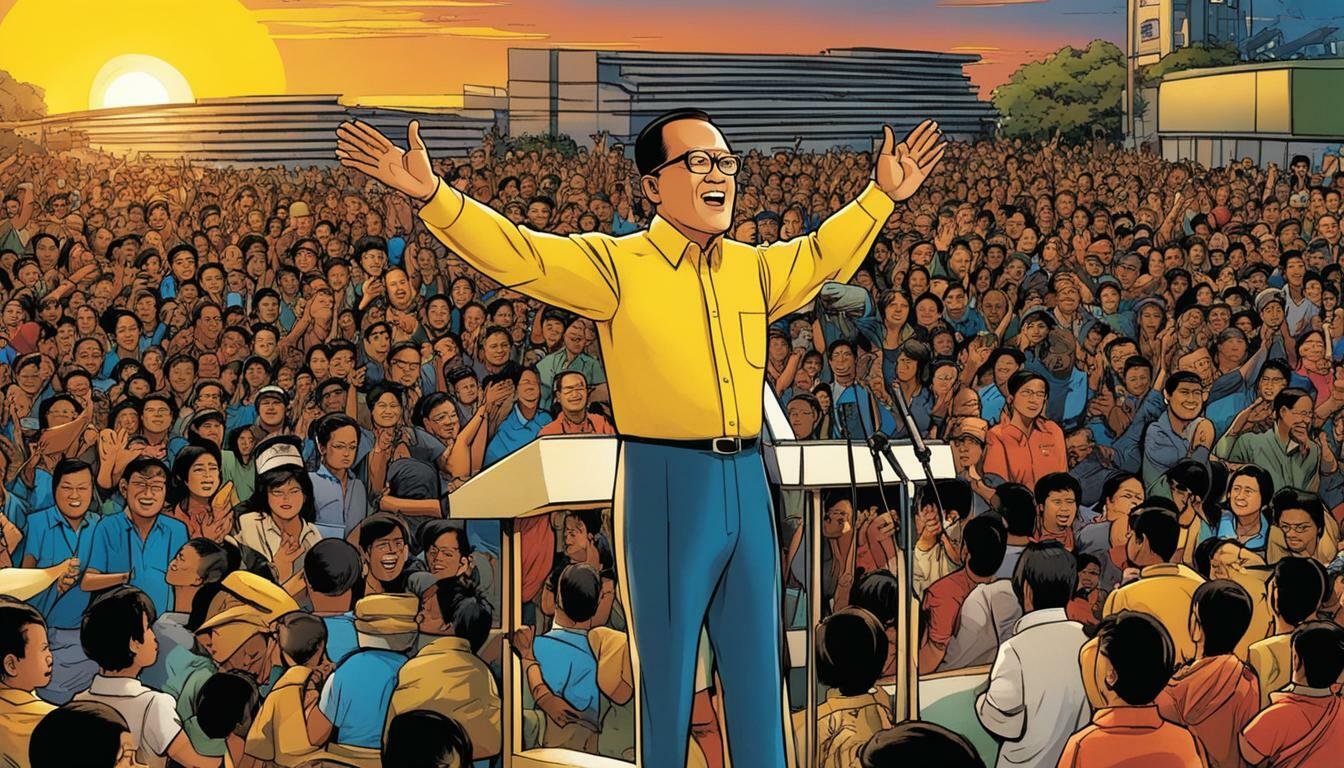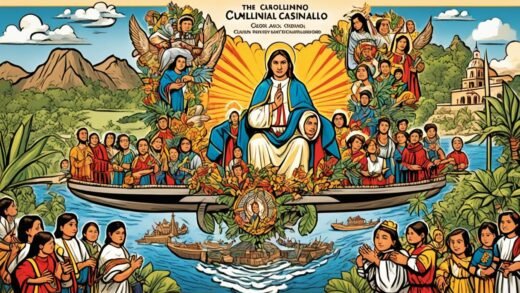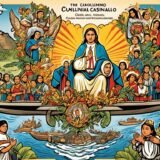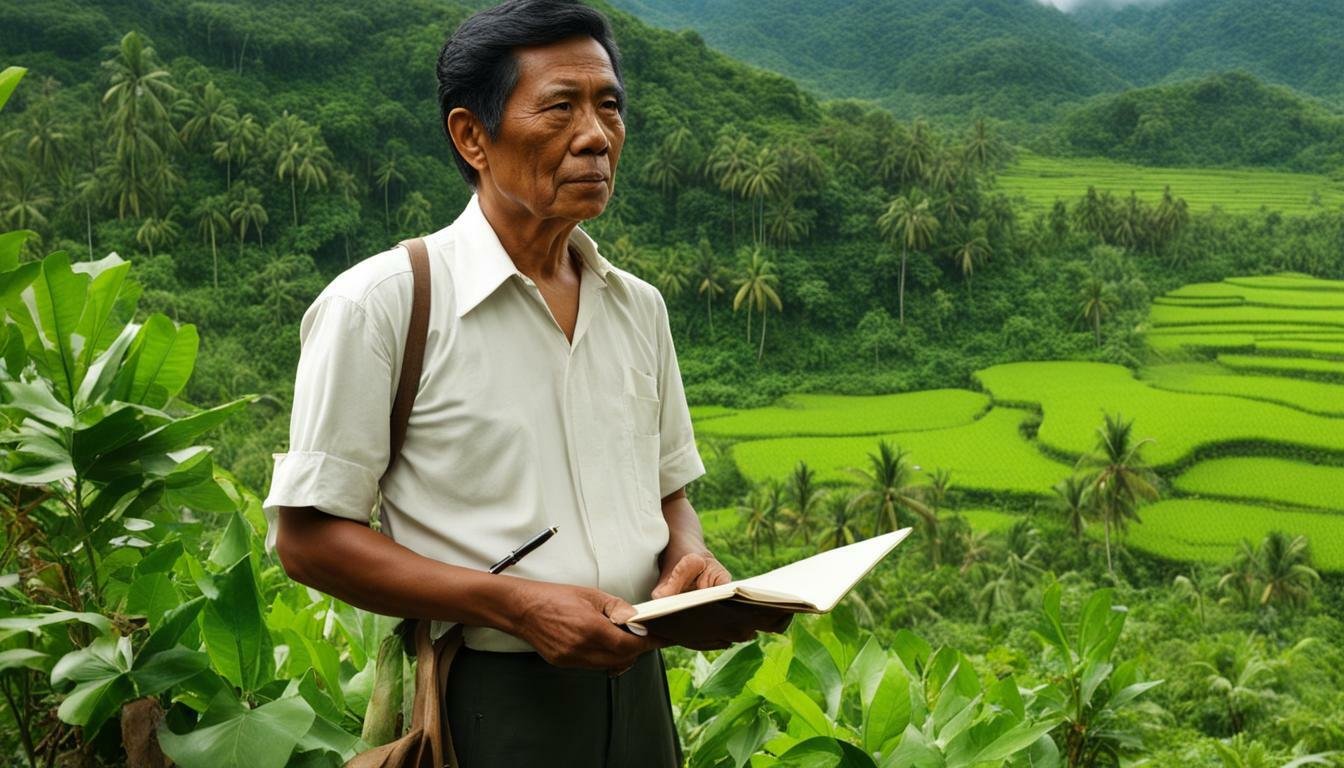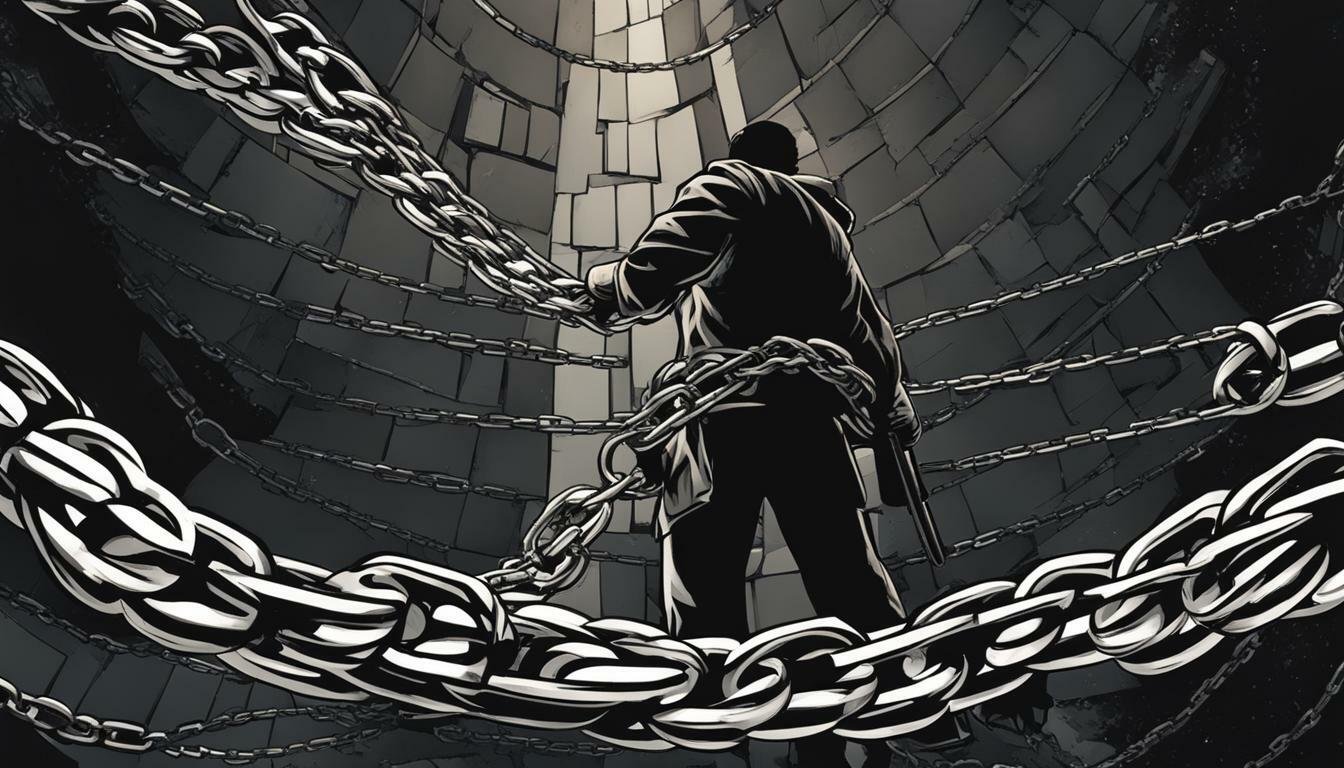Jose P. Laurel: The 3rd President of the Philippines
Did you know that Jose P. Laurel, the 3rd President of the Philippines, navigated the challenging landscape of World War II during his controversial presidency? His tenure was instrumental in shaping the nation’s destiny, making him a pivotal figure in Philippine history.
From his early years to his legacy in law and governance, let’s delve into the life and times of Jose P. Laurel and explore his enduring influence on Philippine politics and law.
Key Takeaways:
- Jose P. Laurel served as the 3rd President of the Philippines during World War II.
- His presidency was marked by controversy and challenges brought about by the Japanese occupation.
- Laurel had a significant impact on Philippine politics, law, and Philippine-U.S. relations.
- His decisions during the Japanese occupation have been subject to historical reinterpretations.
- Jose P. Laurel’s legacy continues to shape the political landscape of the Philippines.
Early Life and Roots of a Future President
In order to understand the journey of Jose P. Laurel, it is important to delve into his early life and the foundational experiences that shaped him into the future president of the Philippines. His story begins with the powerful influence of his ancestors and the humble beginnings in Tanauan.
The Ancestral Influence and Tanauan Beginnings
José P. Laurel was born on March 9, 1891, in Tanauan, Batangas, a province known for its rich historical and cultural heritage. Growing up, Laurel was deeply influenced by his ancestors, who were instrumental in shaping the course of Philippine history. His father, Sotero Laurel, was a renowned lawyer and a member of the Malolos Congress, while his grandfather, Jose Laurel y Garcia, was a highly respected judge. These familial connections laid the groundwork for Laurel’s own journey into law and politics, setting him on a path towards leadership.
Education and Formative Years
Laurel’s thirst for knowledge led him to pursue his education with diligence and determination. He first attended the Tanauan Public School before transferring to Manila, where he enrolled in the University of the Philippines. At the university, he excelled academically and demonstrated his intellectual prowess.
After completing his undergraduate studies, Laurel pursued a law degree at the Escuela de Derecho (now known as the Manila Law College). During this formative period, he began to display his legal acumen and developed a deep understanding of justice and governance.
Controversial Teenage Years and Legal Acquittal
Like many individuals, Laurel’s teenage years were not without their share of unrest and rebellion. In 1909, he found himself involved in a controversial incident that would have far-reaching implications for his personal and professional life. Despite being accused of participating in a group responsible for the killing of a fellow student, Laurel was eventually acquitted of all charges.
This pivotal event not only shaped his character but also ignited in him a desire to fight for justice and fairness. It served as a turning point in his life, propelling him towards a future career in law and politics.
The Ascent to Prominence: Academic Achievements
From the Philippines to Yale: A Scholar’s Journey
In his pursuit of academic excellence, Jose P. Laurel embarked on a remarkable journey that spanned continents and institutions. Born in the Philippines, Laurel’s intellectual curiosity and passion for learning paved the way for his educational accomplishments.
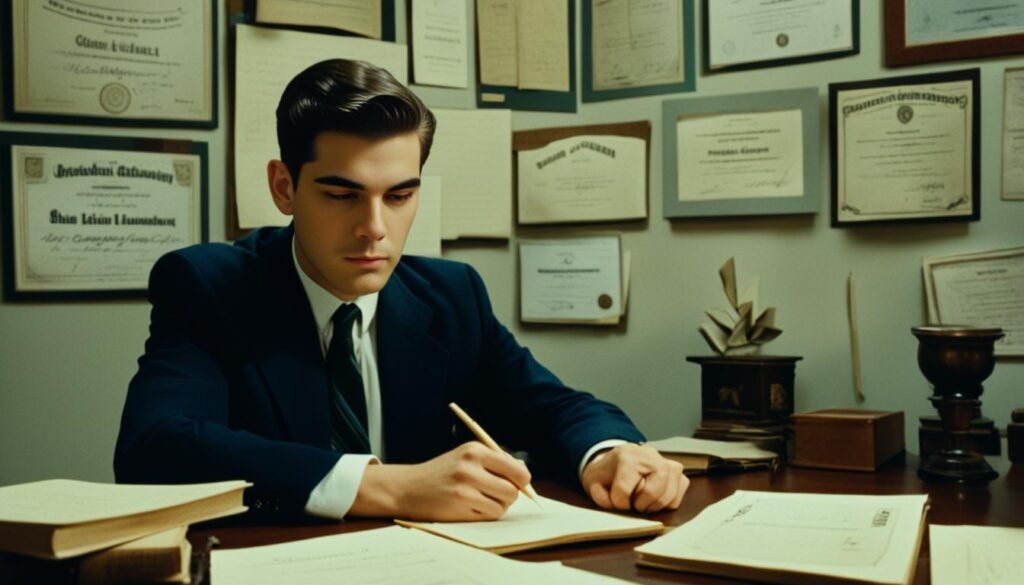
Laurel’s educational path began in the Philippines, where he attended the University of the Philippines College of Law. It was here that he honed his legal acumen and developed a deep understanding of the country’s legal system. His exceptional performance and dedication to his studies set him apart from his peers and foreshadowed his future success.
Driven by his thirst for knowledge, Laurel seized the opportunity to further expand his educational horizons abroad. He was awarded a scholarship to study at Yale University, one of the most prestigious institutions in the United States. This scholarship not only recognized his academic prowess but also provided him with valuable exposure to different legal systems and perspectives.
During his time at Yale, Laurel immersed himself in rigorous academic pursuits. He engaged with renowned legal scholars, broadened his intellectual repertoire, and fine-tuned his critical thinking abilities. The multidimensional educational experience at Yale nurtured Laurel’s intellectual growth, equipping him with the tools necessary to become a visionary leader in his homeland.
International Education and Return to Homeland
Armed with a world-class education, Laurel returned to the Philippines, where he embarked on a mission to uplift his nation through his insights and acquired knowledge. He wasted no time in leveraging his international experiences to contribute to the development and progress of his country.
Laurel’s return to the Philippines marked the beginning of his ascent to prominence. His reputation as a brilliant legal mind and a scholar with a deep understanding of global affairs quickly gained traction. His educational achievements, combined with his unwavering commitment to public service, positioned him as a prominent figure in the academic and political spheres.
As he journeyed back to his homeland, Laurel brought with him a wealth of ideas and perspectives acquired during his international education. These insights would prove instrumental in shaping his future endeavors and influencing his approach to governance.
The combination of Laurel’s strong academic foundation, global exposure, and fervent dedication to the Philippines propelled him further on the path to prominence. It laid the groundwork for his later ventures in politics and public administration, where he would leave an indelible mark on the nation’s history.
The Entry into Politics and Public Administration
After his notable academic achievements, Jose P. Laurel’s career took a turn towards politics and public administration. His expertise and passion for serving the Filipino people led him to play significant roles in the government.
Laurel’s first foray into politics came when he was elected as a municipal councilor of Tanauan, Batangas. This position allowed him to address local issues and gain valuable experience in public service.
Recognizing his potential, Laurel was appointed as the Secretary of the Interior in 1922, under the administration of Governor-General Leonard Wood. In this role, he made important contributions to the country’s governance and initiated reforms to improve the lives of the Filipino people.
Following his tenure as Secretary of the Interior, Laurel pursued a career in legal practice. He became a prominent lawyer, known for his exceptional legal expertise and advocacy for social justice.
Laurel’s strong commitment to public service and his deep understanding of the law propelled him further into the political arena. He served as a member of the Philippine House of Representatives and the Philippine Senate, providing leadership and expertise in shaping the nation’s policies.
His entry into politics and public administration marked a pivotal moment in his career, setting the stage for the influential roles he would later assume in the Philippine government.
Laying the Judicial Foundations: Secretary and Justice
In his pursuit of public service, Jose P. Laurel played significant roles in both the executive and judicial branches of the Philippine government. His tenure as Secretary of the Interior and subsequent appointment as an Associate Justice of the Supreme Court showcased his commitment to establishing a solid legal framework for the nation.
Tumultuous Tenure as Secretary of the Interior
Appointed in 1922, Laurel’s term as Secretary of the Interior was marked by critical challenges and controversies. He actively implemented reforms in local government and oversaw the administration of provinces, municipalities, and cities. However, his efforts were met with opposition and criticism from various factions, exacerbating political tensions during a crucial period of nation-building.
Despite the complexities of his position, Laurel’s resolve to prioritize the welfare of the Filipino people remained unwavering. He focused on improving public services, promoting social justice, and enhancing the efficiency of local government units. His visionary approach and dedication to public service set the stage for his future endeavors in the judiciary.
José P. Laurel as Associate Justice of the Supreme Court
Recognizing Laurel’s legal acumen, President Manuel L. Quezon appointed him as an Associate Justice of the Supreme Court in 1936. In this role, Laurel contributed to shaping the country’s legal landscape and delivering impartial judgments that upheld justice and the rule of law.
As a member of the Supreme Court, Laurel tackled numerous cases of national importance, demonstrating his expertise in constitutional law and his unwavering commitment to legal integrity. His contributions to significant decisions and opinions solidified his reputation as an astute legal mind.
Laurel’s time as an Associate Justice further honed his understanding of the complexities of governance and strengthened his resolve to protect the rights of the Filipino people.
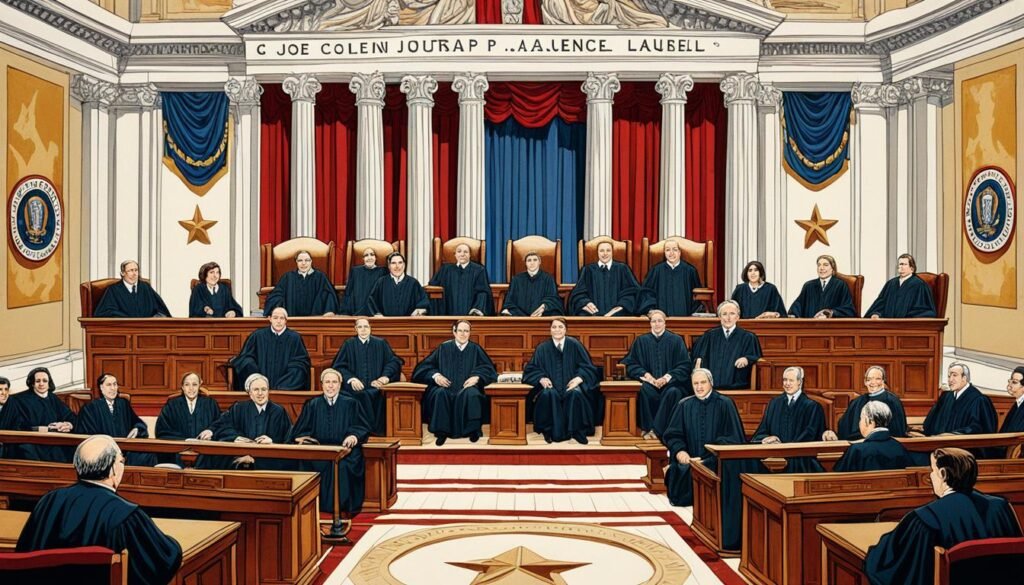
| Key Achievements | Impact |
|---|---|
| Instituted reforms in local government | Improved governance and public services |
| Adjudicated significant constitutional cases | Contributed to the development of Philippine jurisprudence |
| Championed the rights of the Filipino people | Ensured the protection of civil liberties |
The table above highlights some of the key achievements during Laurel’s tenure as Secretary of the Interior and Associate Justice of the Supreme Court. Through his dedication and expertise, Laurel played a crucial role in establishing the foundations of the Philippine legal system and ensuring the preservation of justice and the rule of law.
In the Senate: Crafting the Nation’s Policies
After his stint in the judiciary, José P. Laurel transitioned into the world of politics. In 1925, he ran for senator under the Nacionalista Party and emerged victorious. This marked the beginning of his influential role in shaping the nation’s policies.
As a senator, Laurel championed various causes and advocated for legislative measures that addressed the needs and aspirations of the Filipino people. He played a key role in crafting laws related to education, labor, and agriculture, among others.
One of Laurel’s notable accomplishments as a senator was his proposal for the establishment of a national university. This vision eventually materialized with the founding of the University of the Philippines, which has become a leading institution in the country.
During his time in the Senate, Laurel’s leadership skills, knowledge, and legal expertise were highly respected by his colleagues. He actively participated in debates and discussions, contributing valuable insights and working towards consensus for the betterment of the nation.
With his commitment to public service and his deep understanding of the law, José P. Laurel made significant contributions to the legislative branch of the Philippine government. His time in the Senate laid the foundation for his future endeavors and solidified his position as a key figure in Philippine politics.
Thought Leader in the Constitutional Convention
In addition to his achievements in academia and public administration, Jose P. Laurel played a crucial role as a thought leader in the Constitutional Convention. As one of the key figures shaping the country’s constitution, Laurel made significant contributions to the fundamental rights and principles enshrined in the document.
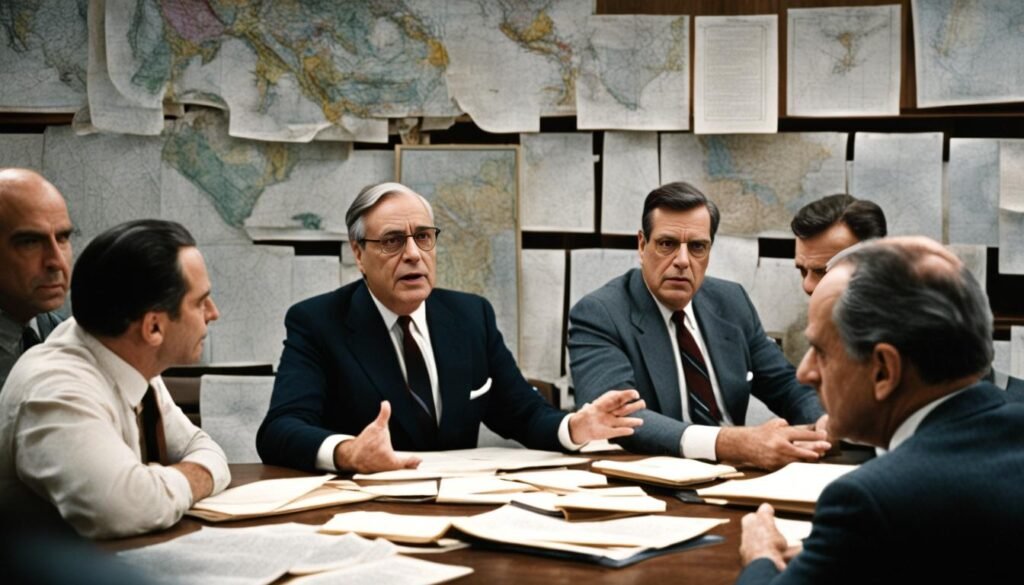
Defender of the Bill of Rights
Throughout the Constitutional Convention, Laurel staunchly defended the importance of protecting individual liberties and ensuring the inclusion of comprehensive provisions in the Bill of Rights. His unwavering commitment to safeguarding the rights of the Filipino people left a lasting impact on the constitutional framework of the Philippines.
Hailed as One of the “Seven Wise Men of the Convention”
Laurel’s expertise, unmatched legal acumen, and ability to articulate complex ideas garnered him widespread recognition during the Constitutional Convention. His contributions were invaluable, as he was hailed as one of the “Seven Wise Men of the Convention,” a testament to his intellectual prowess and leadership.
Jose P. Laurel’s Supreme Court Legacy
Jose P. Laurel’s impact on Philippine law and governance extended beyond his presidency and political career. His tenure as an Associate Justice of the Supreme Court left a lasting legacy in the country’s judicial system.
During his time on the bench, Laurel became known for his intellectual rigor, legal expertise, and commitment to upholding the Constitution. He played a crucial role in shaping important legal decisions and setting precedents that continue to influence the Philippine legal landscape to this day.
One notable aspect of Laurel’s Supreme Court legacy was his unwavering defense of civil liberties and individual rights. He was a staunch advocate for the protection of the Bill of Rights, working diligently to ensure that fundamental freedoms were upheld and respected by the government.
Laurel’s jurisprudence also emphasized the importance of the rule of law and the separation of powers. He firmly believed in the need for an independent judiciary that would serve as a check on the other branches of government. Through his opinions and judgments, Laurel consistently sought to maintain the balance of power and uphold constitutional principles.
Furthermore, Laurel’s Supreme Court legacy extended to his contributions in areas such as labor rights, land reform, and education. He actively participated in landmark cases and wrote influential opinions that shaped the legal framework for these critical issues.
In summary, Jose P. Laurel’s time on the Supreme Court left an indelible mark on the Philippine legal system. His commitment to constitutional principles, defense of civil liberties, and contributions across various legal fields have solidified his legacy as a respected jurist and legal scholar.
From Judiciary to Executive: Becoming President in Turbulent Times
The Japanese Occupation and a Controversial Presidency
Jose P. Laurel’s presidency was marked by extraordinary challenges and controversies due to the Japanese occupation of the Philippines during World War II. In October 1944, the Japanese-appointed Laurel as the puppet president of the newly established Republic of the Philippines. While some saw his presidency as collaborationist, others argued that he adopted a pragmatic approach to protect the Filipino population amidst the harsh circumstances of war.
This image represents the Japanese occupation and contextualizes the situation in which President Jose P. Laurel assumed leadership.
As the president, Laurel faced criticism from those who viewed him as a collaborator with the occupying forces. However, supporters of Laurel emphasize his efforts in protecting the Filipino people and making decisions that aimed to alleviate the suffering caused by the war.
The controversial nature of Laurel’s presidency highlights the complexities of navigating a war-ravaged nation under enemy occupation. The impact of this period on Philippine history continues to be a subject of debate and analysis.
Navigating Through a World War and Its Complexities
During his presidency, Jose P. Laurel encountered immense challenges created by the complexities of World War II. As the Japanese occupied the Philippines, Laurel faced the difficult task of balancing the demands of the occupiers while serving the interests of the Filipino people.
Laurel attempted to navigate through this challenging landscape by implementing policies that aimed to ensure the survival and welfare of the Filipino population. His focus was on maintaining stability and providing essential services despite the limitations imposed by the occupying forces.
While Laurel’s presidency remains controversial, it is important to examine the difficult circumstances under which he operated. The complexities of war presented him with difficult choices, forcing him to walk a fine line between collaboration and pragmatism in an effort to protect the interests of the Filipino people during this turbulent period.
Presidential Policies: Dealing with War and Adversity
The Battle Against Economic Crisis and Food Shortages
During his presidency, Jose P. Laurel faced numerous challenges brought about by the Second World War and the Japanese occupation. One of the significant issues he had to tackle was the economic crisis and the scarcity of food. In an effort to address these pressing concerns, Laurel implemented several policies aimed at stabilizing the economy and ensuring the availability of food for the Filipino people.
Laurel initiated programs to promote agricultural production, encourage self-sufficiency, and alleviate the effects of hunger. These initiatives included:
- Establishing agricultural cooperatives and encouraging farmers to form associations to improve productivity and maximize resources.
- Implementing price controls and fair trade policies to prevent hoarding and exploitation, aiming to provide affordable food for the populace.
- Encouraging the cultivation of alternative food sources to supplement staple crops affected by the war, such as promoting the planting of root crops and vegetables.
- Improving and expanding irrigation systems to support agricultural development and increase land productivity.
Laurel’s strategies helped mitigate the effects of the economic crisis and food shortage to some extent, providing relief and stability during a challenging period.
Resistance and Compromises Under Japanese Rule
As a president under Japanese occupation, Laurel was confronted with the delicate task of maintaining the welfare of the Filipino people while navigating a complex political landscape. He faced pressures from both the occupying Japanese forces and the Filipino resistance movement.
Laurel’s leadership involved making difficult decisions, often requiring compromises to protect the Filipino population. While he collaborated with the Japanese authorities to safeguard the interests of the Philippines, he also worked behind the scenes to support underground resistance efforts and protect Filipino interests.
Despite the challenging circumstances, Laurel’s political maneuvering allowed him to mitigate the harm caused by the occupation and maintain a semblance of stability during wartime.
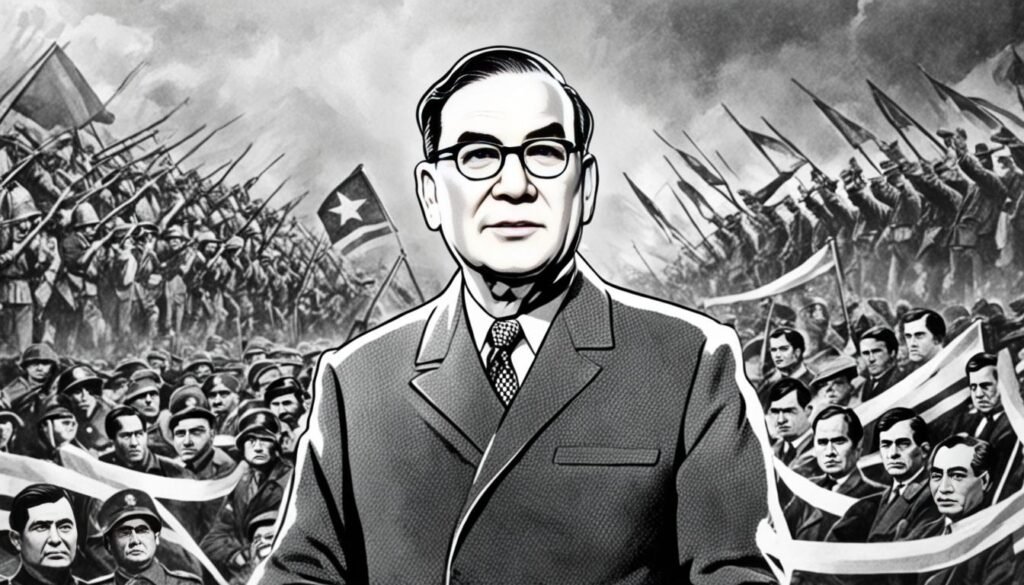
Keywords: economic crisis, food shortages, agricultural production, price controls, fair trade policies, irrigation systems, resistance, compromises, Japanese rule
The Controversy: Collaboration or Pragmatism?
One of the most widely debated aspects of Jose P. Laurel’s presidency is his alleged collaboration with the Japanese occupying forces during World War II. This controversy has sparked intense discussions and differing interpretations among historians and scholars.
Those who defend Laurel argue that his actions were driven by pragmatism and the desire to protect the Filipino people amidst the chaos of war. They maintain that Laurel’s collaboration was a strategic move to secure some semblance of autonomy for the Philippines and prevent further bloodshed.
On the other hand, critics of Laurel view his collaboration as a betrayal of the Philippine’s struggle for independence and an act that compromised the nation’s sovereignty. They argue that Laurel should have taken a stronger stance against the Japanese occupation, even at the risk of personal safety.
Amidst this controversy, it is important to consider the complex circumstances and difficult choices faced by Laurel during this tumultuous period in Philippine history. Evaluating his actions requires a nuanced understanding of the political climate, the constraints he faced, and the potential impact of his decisions on the Filipino people.
Ultimately, the debate surrounding Laurel’s collaboration or pragmatism highlights the complexities of leadership during times of war and the moral dilemmas that leaders often confront. It serves as a reminder that history is rarely clear-cut, and judgments should be made with careful consideration of the context and the available information.
Post-War Challenges and Legal Proceedings
After the end of World War II, the Philippines faced numerous challenges in the aftermath of the Japanese occupation. Jose P. Laurel, the 3rd President of the Philippines, found himself embroiled in legal proceedings and faced accusations of treason.
The Cloud of Treason and Amnesty
A cloud of treason hung over Laurel as he was accused of collaborating with the Japanese during their occupation of the Philippines. However, Laurel consistently maintained that his actions were driven by a pragmatic approach to protect Filipino interests and ensure the welfare of the Filipino people.
Eventually, Laurel was granted amnesty by President Manuel Roxas in 1948, which allowed him to reintegrate into Philippine society and resume his political career.
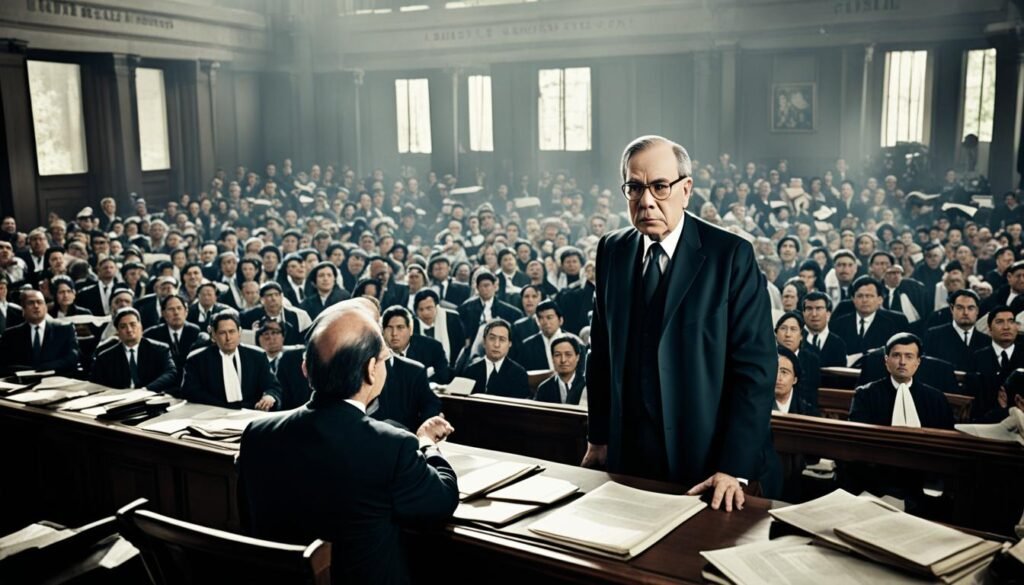
Return to the Political Arena and the 1949 Elections
With the amnesty in place, Laurel returned to the political arena and sought redemption in the eyes of the Filipino people. In 1949, he ran for a senatorial seat under the Nacionalista Party and was successfully elected.
His victory in the 1949 elections marked a significant milestone in Laurel’s post-war journey as he aimed to rebuild his reputation and contribute to the nation’s recovery and progress.
Legacy in Law and Governance
Jose P. Laurel’s legacy in law and governance is a lasting testament to his impact on the Philippines. As the third President of the Philippines, Laurel left a profound imprint on the country’s legal and political landscape. His contributions spanned diverse areas, from his academic achievements to his time in public administration.
Laurel’s background in law played a pivotal role in shaping his legacy. Prior to his presidency, he established himself as a respected legal scholar with an impressive education both in the Philippines and abroad. Laurel attended prestigious institutions such as the University of the Philippines College of Law and Yale University, where he honed his expertise in constitutional law.
His experience and insights garnered during his academic pursuits were put to use when he entered politics and public administration. As Secretary of the Interior, Laurel faced challenges and controversy, but his tenure laid the foundation for future policies and reforms. Additionally, his appointment as Associate Justice of the Supreme Court solidified his reputation as a legal luminary.
Laurel’s influence extended beyond the realms of law and justice. During his time in the Senate, he actively participated in crafting the nation’s policies, showcasing his dedication to public service and governance. As a thought leader in the Constitutional Convention, Laurel staunchly defended the Bill of Rights and was hailed as one of the “Seven Wise Men of the Convention.”
Moreover, Laurel’s presidency during the Japanese Occupation presented him with numerous challenges. While his controversial collaboration with the Japanese regime remains a subject of historical debate, his policies aimed at mitigating the effects of war and adversity cannot be overlooked. He faced economic crises and food shortages head-on, demonstrating his pragmatic approach to governance.
Through his post-war challenges and legal proceedings, Laurel’s legacy continued to evolve. Despite the cloud of treason and subsequent amnesty, he made a remarkable return to the political arena and even ran for president in the 1949 elections.
Jose P. Laurel’s Role in Law and Governance
| Role | Significance |
|---|---|
| Legal Scholar and Academic Achievements | Established Laurel’s expertise and knowledge in constitutional law. |
| Secretary of the Interior | Laid the groundwork for future policies and reforms. |
| Associate Justice of the Supreme Court | Contributed to the development of Philippine jurisprudence. |
| Senator | Active involvement in crafting and shaping national policies. |
| Thought Leader in the Constitutional Convention | Defended the Bill of Rights and played a vital role in shaping the new constitution. |
| President during the Japanese Occupation | Navigated wartime complexities and implemented policies to mitigate the effects of war. |
| Post-War Return to Politics | Returned to the political arena and ran for president in the 1949 elections. |
Jose P. Laurel’s Impact on Philippine-U.S. Relations
Throughout his career, Jose P. Laurel played a significant role in shaping the diplomatic ties between the Philippines and the United States. His contributions in the field of economics, as well as his efforts to foster better post-war relations between the two countries, left a lasting impact.
Economic Missions and the Laurel–Langley Agreement
During his presidency, Laurel embarked on several economic missions to the United States. These missions aimed to secure financial assistance and forge mutually beneficial trade agreements. One of the most notable achievements was the Laurel–Langley Agreement, signed in 1943. The agreement aimed to promote economic cooperation and strengthen the bilateral relationship between the Philippines and the United States.
Fostering Better Post-War Relations
After the devastation of World War II, Laurel played a crucial role in fostering better post-war relations between the Philippines and the United States. He worked towards rebuilding the shattered economy and restoring the trust and goodwill between the two nations. His diplomatic efforts laid the groundwork for future collaborations and partnerships.
A Retrospective: The Complexities of Laurel’s Leadership
As the third president of the Philippines, Jose P. Laurel faced numerous challenges and complex decisions during his time in office. One of the most critical periods in Laurel’s presidency was the Japanese Occupation, which greatly influenced his leadership and the perception of his legacy.
Examining His Decisions During the Japanese Occupation
During the Japanese Occupation, Laurel’s leadership was fraught with difficult choices and moral dilemmas. Faced with the realities of war and occupation, Laurel had to navigate a delicate balance between maintaining the country’s sovereignty and appeasing the occupying forces.
One of the most controversial decisions Laurel made was the establishment of a collaborationist government, which aimed to maintain stability and protect Filipino interests. However, this decision was met with criticism due to its perceived association with the Japanese forces. Laurel’s motives and intentions have been the subject of extensive debate and historical analysis.
“Laurel’s decisions during the Japanese Occupation were undoubtedly complex and surrounded by controversy. While some argue that his actions were driven by pragmatism and the protection of Filipino interests, others view them as acts of collaboration. The true nature of his intentions remains a matter of historical interpretation.” – Historian, Dr. Maria Cruz
Historical Reinterpretations of Laurel’s Presidency
Over the years, there have been various reinterpretations of Laurel’s presidency, especially regarding his actions during the Japanese Occupation. Scholars and historians continue to analyze and debate the complexities of his leadership, seeking a deeper understanding of the political, historical, and social contexts in which Laurel made his decisions.
Some argue that Laurel’s collaborationist government was a necessary response to the harsh realities of the time, highlighting his efforts to protect Filipino interests and maintain some semblance of order. Others criticize his actions as compromising the country’s independence and succumbing to the influence of the occupying forces.
Historical reinterpretations provide valuable insights into Laurel’s presidency, shedding light on the competing narratives and intricate dynamics that shaped his leadership. These nuanced perspectives challenge simplistic portrayals and encourage a more comprehensive understanding of Laurel’s role in Philippine history.
Conclusion
Laurel’s Enduring Influence on Philippine Politics and Law
Jose P. Laurel, the third President of the Philippines, left a lasting impact on the country’s political and legal landscape. Throughout his long and multifaceted career, Laurel demonstrated his dedication to the nation and its people, even in the face of challenging circumstances. His legacy extends beyond his controversial presidency during the Japanese occupation, encompassing his contributions to law, governance, and international relations.
Revisiting the Third Philippine President’s Tenure and Times
Examining Laurel’s leadership during the Japanese occupation reveals a complex tapestry of decisions and actions. While critics have questioned his collaboration with the Japanese, others argue that his pragmatism was necessary to protect and serve the Filipino people. Historical reinterpretations continue to shed light on Laurel’s presidency, prompting a nuanced understanding of this turbulent era.
In retrospect, Jose P. Laurel’s tenure as President reflects the complexities and challenges faced by leaders in times of war and adversity. His enduring influence on Philippine politics and law cannot be ignored, as he played a pivotal role in shaping the nation’s future. By reevaluating Laurel’s actions and considering the historical context, we gain a deeper appreciation for his contributions and a greater understanding of the complexities of governance under extreme circumstances.

